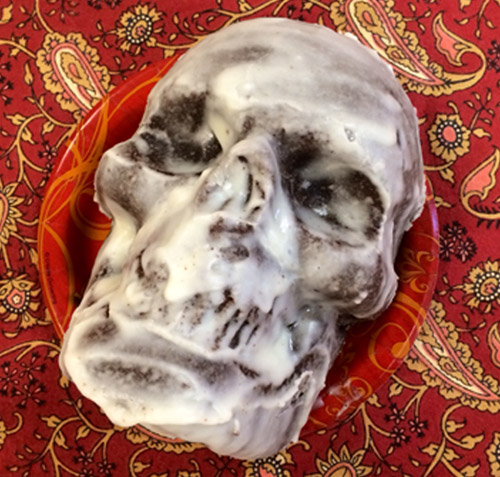Column: Life, death and dessert at the Death Café

There’s a scene in the 1977 film “Annie Hall” in which Woody Allen’s character is at a bookstore with his girlfriend, played by Diane Keaton, and he suddenly places copies of “The Denial of Death” and “Death and Western Thought” in front of her.
“I’m gonna buy you these books, because I think you should read them,” he tells her. “You know, instead of that cat book.”
“That’s, uh … that’s pretty serious stuff there,” she says, laughing nervously.
“Yeah, cause I’m, you know, I’m obsessed with, uh, death, I think,” he says. “Big — big subject with me, yeah.”
I was 15 the first time I saw this scene. I was watching it at home with my uncle Peter, who was terminally ill with colon cancer. He began laughing as heartily as his body, much weakened by the rigors of chemotherapy and radiation, allowed.
More than 13 years later, I still vividly remember thinking how remarkable his reaction was; how someone mere months away from dying was able to laugh about his fate.
Despite my uncle’s example, the ability to think about death objectively has mostly eluded me. An anxious child and lifelong sufferer of obsessive-compulsive disorder, I went through a phase where I regularly begged my mother to reassure me I wouldn’t die for a very, very long time. So I was intrigued when I spotted an advertisement for a group-directed discussion called a “Death Café” at Floyd Memorial Library in Greenport.
Organized by Poppy Johnson, the library’s assistant director, a Death Café is a philosophical forum about death that purports to help people “make the most of their (finite) lives,” according to a library flier.
When the group met for the first time Friday afternoon, I was one of a dozen attendees who gathered around a large table in the library’s conference room. Our ranks included a priest, a beekeeper, two couples, a 91-year-old woman and a man with a history of slipping into diabetic comas.
The proverbial ice was broken when another participant arrived late carrying a glazed chocolate cake shaped like a skull.
As we delved into our deliciously macabre dessert, Ms. Johnson delivered a brief history of Death Cafés, the first of which was reportedly organized by Swiss sociologist and anthropologist Bernard Crettaz in 2004. In the past few years, the volunteer-run model has sprung up in cities around the world.
“I think the idea is that, simply, in our culture we have a real taboo against actually talking about death,” Ms. Johnson told our group before we began. “And anything you don’t talk about somehow takes on scary or magical properties that make it difficult to deal with. Talking about death is one way to embrace life.”
So, that’s what we did.
Rather than make standard introductions (“Hi, I’m Rachel and I’m thrilled to be here!”), Ms. Johnson encouraged each of us to talk briefly about our views on or experiences with death.
The first person to speak said she became aware of death at a young age. She was just 8 years old when her father died. In a short span of time, her brother and mother died, too.
“One of the things I decided was I was not going to be a victim,” she said as I felt my eyes brim with tears under the glare of the basement’s fluorescent lights. An objective discussion about death might have been the goal, but the power of human emotion can’t be underestimated.
The beekeeper told us that in order to help conquer the difficulty she has with death, she began volunteering as a hospice worker almost 10 years ago.
One participant said she decided to come to the Death Café because she figured “anyone who came here would have a sense of humor.”
Another said she was an Irish Catholic who grew up going to wakes and that she’d like to choose how and when she dies.
“Something simple,” she said. “No drama.”
That led us into a brief debate about end-of-life care, with many attendees agreeing they’d like to go out on their own terms. We also talked about “permission to die” — a phenomenon in which people who are terminally ill sometimes don’t die until their loved ones tell them it’s OK to let go.
At one point, our group discussed the idea of an afterlife. Some said they believed in the notion; one man said he believes our spirits become whatever we want them to be. I avoided the priest’s eyes, feeling ashamed, when I revealed that I vacillate on the concept of an afterlife.
“The finality of death scares me,” I told the roomful of strangers, who already felt like friends. “Ceasing to exist when that’s all we’ve ever known.”
They nodded.
Two hours later, I left the library feeling inexplicably moved — and, ironically, reinvigorated about living. I think the others did, too.
We all agreed that we hoped to see each other at next month’s meeting. Alive and well, of course.
Rachel Young is a features writer and copy editor at Times/Review Newsgroup. She can be reached at [email protected].








